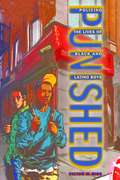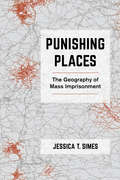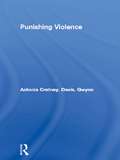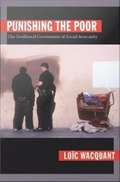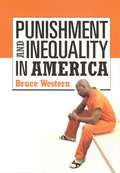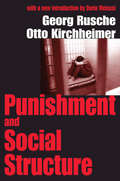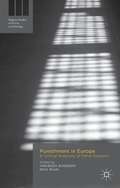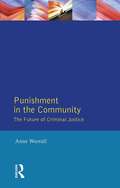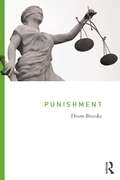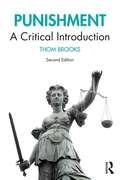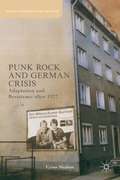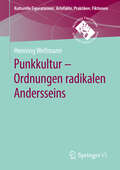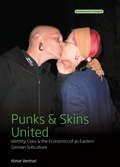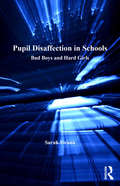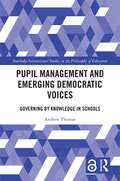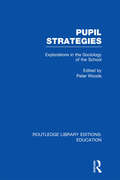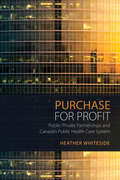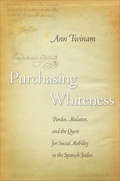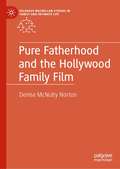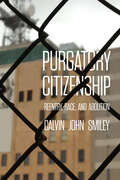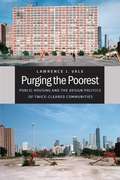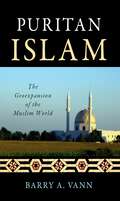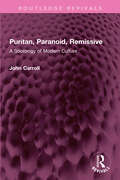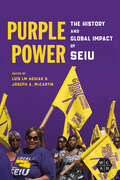- Table View
- List View
Punished: Policing the Lives of Black and Latino Boys (New Perspectives in Crime, Deviance, and Law Series)
by Victor M. RiosThis book examines the difficult lives of young Latino and African American boys caught in a cycles of delinquency in a legal system that limits their opportunities.
Punishing Places: The Geography of Mass Imprisonment
by Jessica T. SimesPunishing Places applies a unique spatial analysis to mass incarceration in the United States. It demonstrates that our highest imprisonment rates are now in small cities, suburbs, and rural areas. Jessica Simes argues that mass incarceration should be conceptualized as one of the legacies of U.S. racial residential segregation, but that a focus on large cities has diverted vital scholarly and policy attention away from communities affected most by mass incarceration today. This book presents novel measures for estimating the community-level effects of incarceration using spatial, quantitative, and qualitative methods. This analysis has broad and urgent implications for policy reforms aimed at ameliorating the community effects of mass incarceration and promoting alternatives to the carceral system.
Punishing Violence
by Gwynn Davis Antonia CretneyIt is a common perception that violent crime is on the increase and social surveys record a growing fear of victimisation among the public. Yet not all violence is criminalised, and much criminal violence still goes unreported. Punishing Violence examines the series of decisions - by victims, police officers, prosecutors and courts - which determine whether or not violent behaviour is criminalised. Antonia Cretney and Gwynn Davis examine the relationships underpinning violence, the reasons for violent acts and the factors militating against successful court prosecutions. In doing so, they provide an authoritative account of the reality of assault and identify a serious dislocation between the purposes of victims and the purposes of the justice system in the treatment of violent crime.
Punishing the Poor: The Neoliberal Government of Social Insecurity
by Loïc WacquantThe punitive turn of penal policy in the United States after the acme of the Civil Rights movement responds not to risingcriminalinsecurity but to thesocialinsecurity spawned by the fragmentation of wage labor and the shakeup of the ethnoracial hierarchy. It partakes of a broader reconstruction of the state wedding restrictive "workfare" and expansive "prisonfare" under a philosophy of moral behaviorism. This paternalist program of penalization of poverty aims to curb the urban disorders wrought by economic deregulation and to impose precarious employment on the postindustrial proletariat. It also erects a garish theater of civic morality on whose stage political elites can orchestrate the public vituperation of deviant figures-the teenage "welfare mother," the ghetto "street thug," and the roaming "sex predator"-and close the legitimacy deficit they suffer when they discard the established government mission of social and economic protection. By bringing developments in welfare and criminal justice into a single analytic framework attentive to both the instrumental and communicative moments of public policy,Punishing the Poorshows that the prison is not a mere technical implement for law enforcement but a core political institution. And it reveals that the capitalist revolution from above called neoliberalism entails not the advent of "small government" but the building of an overgrown and intrusive penal state deeply injurious to the ideals of democratic citizenship.
Punishment and Inequality in America
by Bruce WesternOver the last thirty years, the prison population in the United States has increased more than seven-fold to over two million people, including vastly disproportionate numbers of minorities and people with little education. For some racial and educational groups, incarceration has become a depressingly regular experience, and prison culture and influence pervade their communities. Almost 60 percent of black male high school drop-outs in their early thirties have spent time in prison. In Punishment and Inequality in America, sociologist Bruce Western explores the recent era of mass incarceration and the serious social and economic consequences it has wrought. Punishment and Inequality in America dispels many of the myths about the relationships among crime, imprisonment, and inequality. While many people support the increase in incarceration because of recent reductions in crime, Western shows that the decrease in crime rates in the 1990s was mostly fueled by growth in city police forces and the pacification of the drug trade. Getting “tough on crime” with longer sentences only explains about 10 percent of the fall in crime, but has come at a significant cost. Punishment and Inequality in America reveals a strong relationship between incarceration and severely dampened economic prospects for former inmates. Western finds that because of their involvement in the penal system, young black men hardly benefited from the economic boom of the 1990s. Those who spent time in prison had much lower wages and employment rates than did similar men without criminal records. The losses from mass incarceration spread to the social sphere as well, leaving one out of ten young black children with a father behind bars by the end of the 1990s, thereby helping perpetuate the damaging cycle of broken families, poverty, and crime. The recent explosion of imprisonment is exacting heavy costs on American society and exacerbating inequality. Whereas college or the military were once the formative institutions in young men’s lives, prison has increasingly usurped that role in many communities. Punishment and Inequality in America profiles how the growth in incarceration came about and the toll it is taking on the social and economic fabric of many American communities.
Punishment and Social Structure
by Otto KirchheimerWhy are certain methods of punishment adopted or rejected in a given social situation? To what extent is the development of penal methods determined by basic social relations? The answers to these questions are complex, and go well beyond the thesis that institutionalized punishment is simply for the protection of society. While today's punishment of offenders often incorporates aspects of psychology, psychiatry, and sociology, at one time there was a more pronounced difference in criminal punishment based on class and economics. Punishment and Social Structure originated from an article written by Georg Rusche in 1933 entitled "Labor Market and Penal Sanction: Thoughts on the Sociology of Criminal Justice." Originally published in Germany by the Frankfurt Institute of Social Research, this article became the germ of a theory of criminology that laid the groundwork for all subsequent research in this area. Rusche and Kirchheimer look at crime from an historical perspective, and correlate methods of punishment with both temporal cultural values and economic conditions. The authors classify the history of crime into three primary eras: the early Middle Ages, in which penance and fines were the predominant modes of punishment; the later Middle Ages, in which harsh corporal punishment and capital punishment moved to the forefront; and the seventeenth century, in which the prison system was more fully developed. They also discuss more recent forms of penal practice, most notably under the constraints of a fascist state.The majority of the book was translated from German into English, and then reshaped by Rusche's co-author, Otto Kirchheimer, with whom Rusche actually had little discussion. While the main body of Punishment and Social Structure are Rusche's ideas, Kirchheimer was responsible for bringing the book more up-to-date to include the Nazi and fascist era. Punishment and Social Structure is a pioneering work that sets a paradigm for the study of crime and punishment.
Punishment in Europe
by Vincenzo RuggieroThis collection brings together leading international scholars and practitioners to provide a critical guide to penal systems across Europe. Each chapter forms a case study outlining the main contours of each national penal system, identifying and interpreting the combination of forces driving penal practice in that country. Through its exploration of twelve different Western and Eastern European countries, this collection identifies the national particularities, but also the commonalities and cross talk between penal systems, such as the overuse of imprisonment and the harsher sanctions against the poor when breaking the law. The book challenges this bias with a call for a more critical, public criminology, raising fundamental questions about how we justify and deliver punishment in Europe. Includes contributions from I#65533;aki Rivera Beiras, Emma Bell, Miranda Boone, Bernd Dollinger, Patrizio Gonnella, Philip Gounev, Hanns von Hofer, Vassilis Karydis, Nikolaos K. Koulouris, Andrea Kretschmann, M#65533;nica Aranda Oca#65533;a, Laura Piacentini, Monika Platek, Philippe Robert, Mary Rogan, Ren#65533; van Swaaningen and Henrik Tham.
Punishment in the Community: The Future of Criminal Justice
by Anne WorrallPunishment in the Community: The Future of Criminal Justice challenges the widely held assumption that punishment through imprisonment is central to the criminal justice system. Contemporary political debate assumes that penality is synonymous with prison. However, in reality, the vast majority of people admitting to, or convicted of criminal offences are dealt with using non-custodial penal measures.
Punishment: 2nd Edition (Crime And Punishment: Critical Essays In Legal Philosophy Ser.)
by Thom BrooksPunishment is a topic of increasing importance for citizens and policymakers. Why should we punish criminals? Which theory of punishment is most compelling? Is the death penalty ever justified? These questions and many others are addressed in this highly engaging guide. Punishment is a critical introduction to the philosophy of punishment, offering a new and refreshing approach that will benefit readers of all backgrounds and interests. The first critical guide to examine all leading contemporary theories of punishment, this book explores – among others – the communicative theory of punishment, restorative justice, and the unified theory of punishment. Thom Brooks examines several case studies in detail, including capital punishment, juvenile offending, and domestic abuse. Punishment highlights the problems and prospects of different approaches in order to argue for a more pluralistic and compelling perspective that is novel and groundbreaking. Punishment is a textbook designed to introduce both undergraduate and postgraduate students to the topic of punishment. It will be essential for undergraduate students in: philosophy, criminal justice, criminology, justice studies, law, politics, and sociology.
Punishment: A Critical Introduction (Crime And Punishment: Critical Essays In Legal Philosophy Ser.)
by Thom BrooksPunishment is a topic of increasing importance for citizens and policymakers. Why should we punish criminals? Which theory of punishment is most compelling? Is the death penalty ever justified? These questions and many more are examined in this highly engaging and accessible guide. Punishment is a critical introduction to the philosophy of punishment, offering a new and refreshing approach that will benefit readers of all backgrounds and interests. The first comprehensive critical guide to examine all leading contemporary theories of punishments, this book explores – among others – retribution, the communicative theory of punishment, restorative justice and the unified theory of punishment. Thom Brooks applies these theories to several case studies in detail, including capital punishment, juvenile offending and domestic violence. Punishment highlights the problems and prospects of different approaches in order to argue for a more pluralistic and compelling perspective that is novel and ground-breaking. This second edition has extensive revisions and updates to all chapters, including an all-new chapter on the unified theory substantively redrafted and new chapters on cyber-crimes and social media as well as corporate crimes. Punishment is essential reading for undergraduate and graduate students in philosophy, criminal justice, criminology, justice studies, law, political science and sociology.
Punk Rock And German Crisis
by Cyrus Shahan1977 is usually associated with West German terrorism, but it witnessed another cultural watershed: punk music. A new reckoning with the legacy of political and aesthetic spaces, this book argues the centrality of punk music for understanding crises of state and terrorist violence, American racism and German fascism, and aesthetic production.
Punkkultur – Ordnungen radikalen Andersseins (Kulturelle Figurationen: Artefakte, Praktiken, Fiktionen)
by Henning WellmannPunk war nicht nur Chaos. Punk war immer auch Ordnung. Ausgehend von dieser These nähert sich die Studie dem Phänomen Punk nicht in erster Linie von seinem so auffällig inszenierten Bruch mit bestehenden Ordnungen, sondern legt den Fokus auf genau die Ordnungen, die aus dem Impetus des Zerstörerischen, des Überkommen-Wollens, aus der Sehnsucht nach Neuem entstanden: symbolische Ordnungen, praxeologische Ordnungen, Gefühlsordnungen, ästhetische Ordnungen oder Sprachordnungen. Anhand einer von aktuellen theoretischen Konzepten angeleiteten und empirisch unterfütterten Analyse wird das Zusammenspiel dieser verschiedenen Ordnungen rekonstruiert und aufgezeigt, wie sich mit Punk eine Kultur entwickelt hat, die zentral um Differenz organisiert war – um radikales Anderssein.Der InhaltSubkultur und Stil • Situationismus und Subversion • Provokation und Kapitalismus – Lebensweltliche Beobachtungen • Sound, Ästhetik und Klangerleben • Konzertatmosphären • Veränderte Praktiken – veränderte Körper • Gewalt, Liebe und Geschlechtlichkeit • DIY, Mode und Fanzines • Die Blank Generation und die Mikropolitik der DifferenzDer AutorHenning Wellmann ist Wissenschaftlicher Mitarbeiter bei Kulturprojekte Berlin GmbH.
Punks and Skins United: Identity, Class and the Economics of an Eastern German Subculture (Anthropology of Europe #5)
by Aimar VentselGermany has one of the liveliest and well-developed punk scenes in the world. However, punk in this country is not just a style-based music community. This book provides an anthropological examination of how punk reflects the larger changes and contradictions in post-reunification Germany, such as social segmentation, east-west tensions and local politics. Punk in eastern Germany is a reaction to the marginalization of the working class. As a cultural, social and economic niche, punks create their own controversial “substitute society” to compensate for their low status in mainstream society.
Pupil Disaffection in Schools: Bad Boys and Hard Girls
by Sarah SwannSarah Swann provides a fresh approach to examining the long-standing debates over disaffection, and in particular social class differences in educational achievement, through a mixed methods methodology and the showcasing of new research. By observing pupils as they engage with peers and teachers in school, Swann allows disaffection to be seen and heard in ’real’ events which constructs disaffection differently from objective statistical evidence on school exclusions. Rather than a homogenous identity, this book illustrates disaffection as layered and resting on a series of issues located on the crossroads between the cultural context of the neighbourhood and the public sphere of the school. It plots in a detailed way how these structures interact and mesh to create disaffected identities. Disaffection does not emerge in a vacuum, or without a cause. Pupils arrive at school with a wide variety of experiences and it is from these that they interpret, understand and act out their identities. Whilst the study in part seeks to describe and understand the social world of the school in terms of the pupils’ interpretations of the situation, it analytically frames the perceptions of pupils within a wider social context. In particular it focuses on the relationships between schooling and the wider macro structures and social relations that underpin disaffection. This approach makes the research both critical and interpretative and also able to shed new light on educational policy across England based on an understanding of the role of disaffection.
Pupil Management and Emerging Democratic Voices: Governing by Knowledge in Schools (Routledge International Studies in the Philosophy of Education)
by Andrew ThomasThis book addresses the distance between contemporary philosophical critiques of education and the classroom context by applying new insights from social philosophy, neurology and historical analysis to common school practices.Critiquing contemporary academic and political debates concerning the use, and misuse, of assessment tools, psychometric testing and classroom management on pupils, this book looks in detail at the consequences of such practices for pupil management and the nurturing of their emerging democratic voices and sense of independence. This book explores these practices in the context of broader social phenomena such as the state of exception, management for legibility, self‑regulation, governmentality and epidemiology. Chapters link critical and philosophical considerations about politics, administration and the brain to real‑world classroom realities and everyday educational activities, forming an important contribution to the wider discourse on learning and inclusion in contemporary school systems.Bringing philosophical and historical insights to bear on the concrete practices of educational life, this book will be of interest to scholars, researchers and postgraduate students in the field of philosophy of education as well as schooling, classroom practice, and pedagogy and didactics more broadly.
Pupil Strategies: Explorations in the Sociology of the School (Routledge Library Editions: Education)
by Peter WoodsWhat do pupils actually do in school? There are remarkably few studies that take the pupils’ perspective and reconstruct experience from their point of view within the context of their own cultures and careers. This volume brings together a number of research studies on various aspects of how pupils cope with schools. The theoretical papers consider amongst other issues a developmental model of the growth of pupil strategies based on primary and secondary socialisation; a discussion of ‘interactionist empiricism’ which argues for co-ordinated research between micro and macro perspectives and an extended overview of the general sociological background of work on teacher and pupil strategies. The empirical articles consider a number of themes ranging from strategies employed in answering teacher questions to the power and influence of the pupil peer group in the development of attitudes and behaviour.
Purchase for Profit
by Heather WhitesideSince the start of the twenty-first century, Canadian provinces have increasingly begun turning to the private sector to finance and construct large-scale infrastructure projects. From a critical public policy perspective, the danger of these public-private partnerships (P3s) is that they are more than just new ways to deliver public infrastructure. They are neoliberal projects that privatize and corporatize the basis of public services.Analyzing four Canadian P3 hospital projects, Heather Whiteside argues that P3s not only fail to fulfill the promises made by their proponents but also compromise public control of health policy, outcomes, and future plans. Yet, despite these disadvantages, the use of P3s is being normalized and expanded in BC and Ontario through capital planning frameworks and special government agencies that support and encourage P3 projects. Based on extensive interviews with academic experts, union representatives, provincial government decision-makers, and private sector partners, Purchase for Profit will be important for those studying public policy in any of the areas in which P3s are now being adopted.
Purchasing Whiteness: Pardos, Mulattos, and the Quest for Social Mobility in the Spanish Indies
by Ann TwinamThe colonization of Spanish America resulted in the mixing of Natives, Europeans, and Africans and the subsequent creation of a casta system that discriminated against them. Members of mixed races could, however, free themselves from such burdensome restrictions through the purchase of a gracias al sacar—a royal exemption that provided the privileges of Whiteness. For more than a century, the whitening gracias al sacar has fascinated historians. Even while the documents remained elusive, scholars continually mentioned the potential to acquire Whiteness as a provocative marker of the historic differences between Anglo and Latin American treatments of race. Purchasing Whiteness explores the fascinating details of 40 cases of whitening petitions, tracking thousands of pages of ensuing conversations as petitioners, royal officials, and local elites disputed not only whether the state should grant full whiteness to deserving individuals, but whether selective prejudices against the castas should cease. Purchasing Whiteness contextualizes the history of the gracias al sacar within the broader framework of three centuries of mixed race efforts to end discrimination. It identifies those historic variables that structured the potential for mobility as Africans moved from slavery to freedom, mixed with Natives and Whites, and transformed later generations into vassals worthy of royal favor. By examining this history of pardo and mulatto mobility, the author provides striking insight into those uniquely characteristic and deeply embedded pathways through which the Hispanic world negotiated processes of inclusion and exclusion.
Pure Fatherhood and the Hollywood Family Film (Palgrave Macmillan Studies in Family and Intimate Life)
by Denise McNulty NortonThis book maps father failure and redemption through three decades of Hollywood family films, revealing how libertarian notions that align agency with autonomy lead to new conflicts for the contemporary father. The films find resolution to these conflicts through a re-gendering of parenting as relationship. In their creation of a ‘pure’ fatherhood that is valorised as authentic for its lack of parental responsibilities, the films serve to challenge the perception that fathering enacted outside the nuclear family structure is fragile. McNulty Norton finds in the films a new essentialism that secures the pure relationship to the biological father, reinforcing his position in the face of changing family forms.
Purgatory Citizenship: Reentry, Race, and Abolition
by Calvin John SmileyReentry after release from incarceration is often presented as a story of redemption. Unfortunately, this is not the reality. Those being released must navigate the reentry process with diminished legal rights and amplified social stigmas, in a journey that is often confusing, complex, and precarious. Making use of life-history interviews, focus groups, and ethnographic fieldwork with low-income urban residents of color, primarily Black men, Calvin John Smiley finds that reentry requires the recently released to negotiate a web of disjointed and often contradictory systems that serve as an extension of the carceral system. No longer behind bars but not fully free, the recently released navigate a state of limbo that deprives them of opportunity and support while leaving them locked in a cycle of perpetual punishment. Warning of the dangers of reformist efforts that only serve to further entrench carceral systems, Purgatory Citizenship advocates for abolitionist solutions rooted in the visions of the people most affected.
Purging the Poorest: Public Housing and the Design Politics of Twice-Cleared Communities
by Lawrence J. ValeThe building and management of public housing is often seen as a signal failure of American public policy, but this is a vastly oversimplified view. In Purging the Poorest, Lawrence J. Vale offers a new narrative of the seventy-five-year struggle to house the "deserving poor. " In the 1930s, two iconic American cities, Atlanta and Chicago, demolished their slums and established some of this country's first public housing. Six decades later, these same cities also led the way in clearing public housing itself. Vale's groundbreaking history of these "twice-cleared" communities provides unprecedented detail about the development, decline, and redevelopment of two of America's most famous housing projects: Chicago's Cabrini-Green and Atlanta's Techwood /Clark Howell Homes. Vale offers the novel concept of design politics to show how issues of architecture and urbanism are intimately bound up in thinking about policy. Drawing from extensive archival research and in-depth interviews, Vale recalibrates the larger cultural role of public housing, revalues the contributions of public housing residents, and reconsiders the role of design and designers.
Purging the Poorest: Public Housing and the Design Politics of Twice-Cleared Communities (Historical Studies Of Urban America Ser.)
by Lawrence J. ValeThe building and management of public housing is often seen as a signal failure of American public policy, but this is a vastly oversimplified view. In Purging the Poorest, Lawrence J. Vale offers a new narrative of the seventy-five-year struggle to house the “deserving poor.”In the 1930s, two iconic American cities, Atlanta and Chicago, demolished their slums and established some of this country’s first public housing. Six decades later, these same cities also led the way in clearing public housing itself. Vale’s groundbreaking history of these “twice-cleared” communities provides unprecedented detail about the development, decline, and redevelopment of two of America’s most famous housing projects: Chicago’s Cabrini-Green and Atlanta’s Techwood /Clark Howell Homes. Vale offers the novel concept of design politics to show how issues of architecture and urbanism are intimately bound up in thinking about policy. Drawing from extensive archival research and in-depth interviews, Vale recalibrates the larger cultural role of public housing, revalues the contributions of public housing residents, and reconsiders the role of design and designers.
Puritan Islam: The Geoexpansion of the Muslim World
by Barry A. VannIn this unique analysis of Muslim population shifts in the Western world, geographer Barry A. Vann provides fresh insights into the theological factors that play into these demographic trends. Vann examines the "imagined geographies" of Muslims with a puritan orientation. People with this mind-set are little inclined to accept a pluralistic, multicultural, live-and-let-live concept of society. And conflicts between conflicting value systems are almost inevitable. Vann notes that this purist approach to Islam is certainly not universal among Muslims, and there are many varying interpretations that are more moderate in outlook. Nonetheless, the undeniable theological background of all Muslim communities colors their values and attitudes, and must be taken into consideration when attempting to understand the potential conflicts between contiguous Muslim and non-Muslim groups. Given the fact that the population of Muslim immigrants is growing in traditionally Christian and increasingly secular countries of the Western world while the resident populations are either stagnant or declining, Vann's insightful analysis of the ways in which Islam influences perceptions of community and geography is of great relevance.
Puritan, Paranoid, Remissive: A Sociology of Modern Culture (Routledge Revivals)
by John CarrollFirst published in 1977, Puritan, Paranoid, Remissive investigates the process of the transformation of Western society in the twentieth century. The author questions assumptions of sociological fashion and goes beyond the descriptions of changes in the economy, government, education, the family, work, leisure and the arts, to a deeper level of historical cause. He proposes three-character types, or patterns of psychological disposition, to indicate respectively the ‘Puritan’ past that is waning, the immediate ‘paranoid’ past that has exemplified society’s crisis of transition, and the ‘remissive’ future, whose ideology already permeates the present. These types reflect his leading theme – the historical decline of the authority of the individual. John Carroll believes that culture has moved faster than character. Focusing on what is conventionally the upper middle class – the bourgeoisie – he proposes the emergence of a new ‘remissive’ culture from the ruins of the old Puritan order, and concludes that the pathology, the remiss nervousness of contemporary Westerners, results from their futile attempts to adapt their enduring Puritan disposition to their hedonist ideals. The twenty-first century carries remnants of this transformation and will be of interest to students of sociology, philosophy, history and political science.
Purple Power: The History and Global Impact of SEIU (Working Class in American History)
by Janice Fine Maite Tapia Joseph A. McCartin Luís Lm Aguiar Adrienne E Eaton Euan Gibb Laurence Hamel-Roy Tashlin Lakhani Yanick Noiseux Benjamin L Peterson Allison Porter Alyssa May Kuchinski Veronica Terriquez Kyoung-Hee YuChartered in 1921, the Service Employees International Union (SEIU) is a worldwide organization that represents more than two million workers in occupations from healthcare and government service to custodians and taxi drivers. Women form more than half the membership while people in minority groups make up approximately forty percent. Luís LM Aguiar and Joseph A. McCartin edit essays on one of contemporary labor’s bedrock organizations. The contributors explore key episodes, themes, and features in the union’s recent history and evaluate SEIU as a union with global aspirations and impact. The first section traces the SEIU’s growth in the last and current centuries. The second section offers in-depth studies of key campaigns in the United States, including the Justice for Janitors and Fight for $15 movements. The third section focuses on the SEIU’s work representing low-wage workers in Canada, Australia, Europe, and Brazil. An interview with Justice for Janitors architect Stephen Lerner rounds out the volume. Contributors: Luís LM Aguiar, Adrienne E. Eaton, Janice Fine, Euan Gibb, Laurence Hamel-Roy, Tashlin Lakhani, Joseph A. McCartin, Yanick Noiseux, Benjamin L. Peterson, Allison Porter, Alyssa May Kuchinski, Maite Tapia, Veronica Terriquez, and Kyoung-Hee Yu
